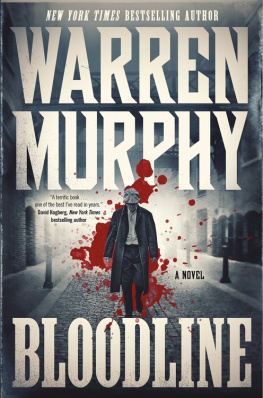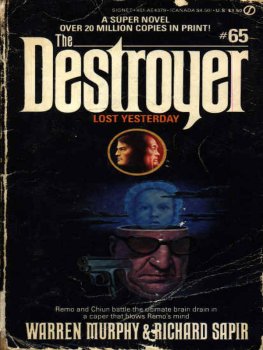***********************************************
* Title : #028 : SHIP OF DEATH *
* Series : The Destroyer *
* Author(s) : Warren Murphy and Richard Sapir *
* Location : Gillian Archives *
***********************************************
INTRODUCTION
It was the early 1960s and America was in trouble. Crime was getting out of hand, engulfing the country, forcing it surely toward either anarchy or dictatorship.
So a young president of the United States made a brave decision, and CURE was born. CURE was a supersecret agency, set up to save the Constitution by working outside it to fight the rising tide of crime. And, to head this agency that only he in government would know about, the president selected Dr. Harold W. Smith, a tight-lipped New Englander who had served in the OSS and the CIA.
CURE had everything: money, manpower, and a free hand. And still it failed. It needed something more. It needed a killer arm to mete out its own brand of justice.
So Remo Williams, a young, Newark policeman, was framed for a murder he did not commit, sent to an electric chair that did not work, and woke up working for CURE. Remo's training was put in the hands of Chiun, a tiny, aged Korean from the North Korean village of Sinanju. For centuries, Sinanju had provided the world with assassins and Chiun was the latest Master of Sinanju.
Chiun, the Master of all the Oriental killing arts, taught Remo to kill.
At first it was just a job for Remo. But as the years went on and the training went on, it became more than a job and he became more than a man. He became a Master of Sinanju himself, a troubled man torn between his Western heritage and his Eastern training.
And the bodies piled up.
CHAPTER ONE
She was big.
From even the first thought of her in the mind of Demosthenes Skouratig, she was big. There had never been one bigger.
Almost a half mile long from bow to stern she was, and tall as an apartment house. You could lay two Queen Elizabeth II's end to end and fit them in her big belly. You could parachute from the top of the superstructure to her cavernous insides. Made to haul oil from the Persian Gulf she was, and she had the power systems of a large city, the gut strength of a thousand armies of tanks, and the capacity of all the trucking of an entire state.
"Make her a little longer, sir, and we could lay her across the Atlantic," joked Sir Ramsey Frawl, president of Frawl Shipping Combine Ltd.
Demosthenes Skouratis smiled. He did not smile often and he did not smile widely. You had to watch the crease in his dark lips part ever so slightly to realize the sallow face was showing a form of joy.
"I am in ships, not in pipelines, Sir Ramsey," said Demosthenes Skouratis. He drank almond-flavored water and refused a glass of port. He was a short man, squat as if he had been compressed from a taller one. He was ugly enough to make other men wonder how he always managed to get beautiful women trailing after him, and rich enough to make them sure they knew why. But those who thought Skouratis ruled women through his money were wrong. Many people were wrong about Demosthenes Skouratis. For Sir Ramsey Frawl, such a mistake would cost him Attington, the grand, green estate at which Skouratis had first outlined his idea for the big ship.
Attington had survived raids from the Norsemen, the Norman invasion, the great depressions, the staggering drain on the family's fortune from World War II and ensuing taxes, several national scandals involving the Frawl baronetcy, and the growing disinclination of the Frawl family's younger members to preserve the family business. It would not survive doing business with Skouratis, the former Greek shoeshine boy, whose shipping interests were rivaled only by those of another Greek, Aristotle Thebos.
When Frawl announced to his board of directors that they were going to build the largest ship in the world for Demosthenes Skouratis himself, Frawl stock immediately jumped to an historic high on the London exchange. It did not bother them that someone was selling short on large amounts of Frawl stock. If they had been more suspicious, instead of enthusiastic, they might have hired detectives to find out who was behind the small brokerage house that was selling their stock short. And they would have found out that it was Demosthenes Skouratis himself.
When someone sells stock short, it means he is selling stock he doesn't own. When it comes time for him to deliver the stock, if the stock has gone up, he will lose money because it will cost him more to procure the share than he received for already selling that same share. But if the stock should plummet, if he has sold stock for 150 pounds a share, for example, and then is able to cover his sales by buying the stock for a dismal two pounds a share, he has made a 7,400 percent profit.
This is what Demosthenes Skouratis did with Frawl shipping.
He knew something Sir Ramsey Frawl did not. Doing business with Demosthenes Skouratis was not an instant road to riches, but, instead, an opening of your veins to let him suck the blood out. A handshake with Skouratis did not conclude the bargaining, it started it.
At first, one would have thought he was Sir Ramsey's long lost father. He helped the firm to find financing. He used his influence to open up the Skaggerac shipyards in Stavanger, Norway for the building of the hull. When Frawl Ltd. was so heavily committed to this one project that it could not survive without its successful completion, the friendly long lost father started making changes. He wanted different metals here and a different structure there. He did it so regularly and in such small detail that the ship he would receive was almost twice the value of the one he had initially ordered. Sir Ramsey, himself now gaunt and haggard with dark signs of worry under his eyes, personally refused the last change.
"Mr. Skouratis, we are not equipped to install atomic-powered engines. I'm sorry, sir, we cannot do it."
Skouratis shrugged. He was not a shipbuilder, he said. All he knew was what he wanted. And he wanted atomic engines.
"You cannot have them from us, sir."
"Then I do not want your ship."
"But we have a contract, sir."
"Let us see what the courts say about that," said Skouratis.
"You know quite well, sir, that we are so heavily in debt that we cannot wait for complicated litigation to win us our money."
Skouratis said he knew nothing about courts. All he knew was what he wanted and what he wanted was atomic engines. He pointed out that the final design of the ship would perfectly support atomic engines.
"If we are going to succumb financially," said Sir Ramsey with all the dignity of hundreds of years of nobility, "then at least we shall do so with a certain succinctness. The answer is no. Do your scabrous worst."
But Greek shoeshine boys are not put off by a few trifling words. Life is too hard on the bare edge of starvation. And he who raises himself in the gutters of Piraeus does not build his schemes for regal gestures to undermine.
While Skouratis did not know about shipbuilding and he did not know about courts, he did know about financing. Now Sir Ramsey was talking his game. There was no great, great problem and talk of bankruptcy was nonsense. Why, Sir Ramsey wasn't even using the full potential of his credit base. There was the vast worth of Attington, a great landed estate. Sir Ramsey's problem was that he could not turn a thousand years of British history into liquidity. But Skouratis could and he would help him. Now if Sir Ramsey did not lose his head with all this bankruptcy talk, Frawl Combine could extend its credit base, put in atomic engines and make a vast profit. Did Skouratis ever say he would not pay handsomely for the engines? No. Never. He wanted to pay for what he got. But he wanted what he wanted.
Next page



